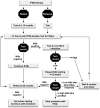Clinical testing for neutralizing antibodies to interferon-β in multiple sclerosis
- PMID: 23277789
- PMCID: PMC3526949
- DOI: 10.1177/1756285612469264
Clinical testing for neutralizing antibodies to interferon-β in multiple sclerosis
Abstract
Biopharmaceuticals are drugs which are based on naturally occurring proteins (antibodies, receptors, cytokines, enzymes, toxins), nucleic acids (DNA, RNA) or attenuated microorganisms. Immunogenicity of these agents has been commonly described and refers to a specific antidrug antibody response. Such immunogenicity represents a major factor impairing the efficacy of biopharmaceuticals due to biopharmaceutical neutralization. Indeed, clinical experience has shown that induction of antidrug antibodies is associated with a loss of response to biopharmaceuticals and also with hypersensitivity reactions. The first disease-specific agent licensed to treat multiple sclerosis (MS) was interferon-β (IFNβ). In its various preparations, it remains the most commonly used first-line agent. The occurrence of antidrug antibodies has been extensively researched in MS, particularly in relation to IFNβ. However, much controversy remains regarding the significance of these antibodies and incorporation of testing into clinical practice. Between 2% and 45% of people treated with IFNβ will develop neutralizing antibodies, and this is dependent on the specific drug and dosing regimen. The aim of this review is to discuss the use of IFNβ in MS, the biological and clinical relevance of anti-IFNβ antibodies (binding and neutralizing antibodies), the incorporation of testing in clinical practice and ongoing research in the field.
Keywords: clinical testing; interferon-β; multiple sclerosis; neutralizing antibodies.
Conflict of interest statement
Figures
Similar articles
-
Frequency and magnitude of interferon β neutralizing antibodies in the evaluation of interferon β immunogenicity in patients with multiple sclerosis.J Interferon Cytokine Res. 2011 Mar;31(3):337-44. doi: 10.1089/jir.2010.0038. Epub 2011 Jan 12. J Interferon Cytokine Res. 2011. PMID: 21226608
-
Neutralizing antibodies to multiple sclerosis treatments.J Manag Care Pharm. 2004 Jun;10(3 Suppl B):S12-9. J Manag Care Pharm. 2004. PMID: 15253685 Review.
-
Clinical practice of analysis of anti-drug antibodies against interferon beta and natalizumab in multiple sclerosis patients in Europe: A descriptive study of test results.PLoS One. 2017 Feb 7;12(2):e0170395. doi: 10.1371/journal.pone.0170395. eCollection 2017. PLoS One. 2017. PMID: 28170401 Free PMC article.
-
Interferon beta neutralizing antibodies in multiple sclerosis: neutralizing activity and cross-reactivity with three different preparations.Immunopharmacology. 2000 Jul 20;48(2):95-100. doi: 10.1016/s0162-3109(00)00182-x. Immunopharmacology. 2000. PMID: 10936507
-
Interferon Beta: From Molecular Level to Therapeutic Effects.Int Rev Cell Mol Biol. 2016;326:343-72. doi: 10.1016/bs.ircmb.2016.06.001. Epub 2016 Jul 20. Int Rev Cell Mol Biol. 2016. PMID: 27572132 Review.
Cited by
-
Understanding the role of potential biomarkers in attenuating multiple sclerosis progression via multiomics and network-based approach.PLoS One. 2024 Dec 19;19(12):e0314428. doi: 10.1371/journal.pone.0314428. eCollection 2024. PLoS One. 2024. PMID: 39700118 Free PMC article.
-
Interleukin-17 (IL-17)-induced microRNA 873 (miR-873) contributes to the pathogenesis of experimental autoimmune encephalomyelitis by targeting A20 ubiquitin-editing enzyme.J Biol Chem. 2014 Oct 17;289(42):28971-86. doi: 10.1074/jbc.M114.577429. Epub 2014 Sep 2. J Biol Chem. 2014. PMID: 25183005 Free PMC article.
-
Myxovirus Resistance Protein A mRNA Expression Kinetics in Multiple Sclerosis Patients Treated with IFNβ.PLoS One. 2017 Jan 12;12(1):e0169957. doi: 10.1371/journal.pone.0169957. eCollection 2017. PLoS One. 2017. PMID: 28081207 Free PMC article. Clinical Trial.
-
Development of interferon beta-neutralising antibodies in multiple sclerosis--a systematic review and meta-analysis.Eur J Clin Pharmacol. 2015 Nov;71(11):1287-98. doi: 10.1007/s00228-015-1921-0. Epub 2015 Aug 14. Eur J Clin Pharmacol. 2015. PMID: 26268445
-
Early implementation of QbD in biopharmaceutical development: a practical example.Biomed Res Int. 2015;2015:605427. doi: 10.1155/2015/605427. Epub 2015 May 17. Biomed Res Int. 2015. PMID: 26075248 Free PMC article. Review.
References
-
- Barnett M., Prineas J. (2004) Relapsing and remitting multiple sclerosis: pathology of the newly forming lesion. Ann Neurol 55: 458–468 - PubMed
-
- Beck R., Chandler D., Cole S., Simon J., Jacobs L., Kinkel R., et al. (2002) Interferon beta-1a for early multiple sclerosis: CHAMPS trial subgroup analyses. Ann Neurol 51: 481–490 - PubMed
-
- Bendtzen K. (2003) Anti-IFN BAb and NAb antibodies: a minireview. Neurology 61: S6–S10 - PubMed
-
- Bertolotto A., Gilli F., Sala A., Capobianco M., Malucchi S., Milano E., et al. (2003) Persistent neutralizing antibodies abolish the interferon beta bioavailability in MS patients. Neurology 60: 634–639 - PubMed
-
- Bertolotto A., Sala A., Caldano M., Capobianco M., Malucchi S., Marnetto F., et al. (2007) Development and validation of a real time PCR-based bioassay for quantification of neutralizing antibodies against human interferon-beta. J Immunol Methods 321: 19–31 - PubMed
LinkOut - more resources
Full Text Sources
Other Literature Sources


